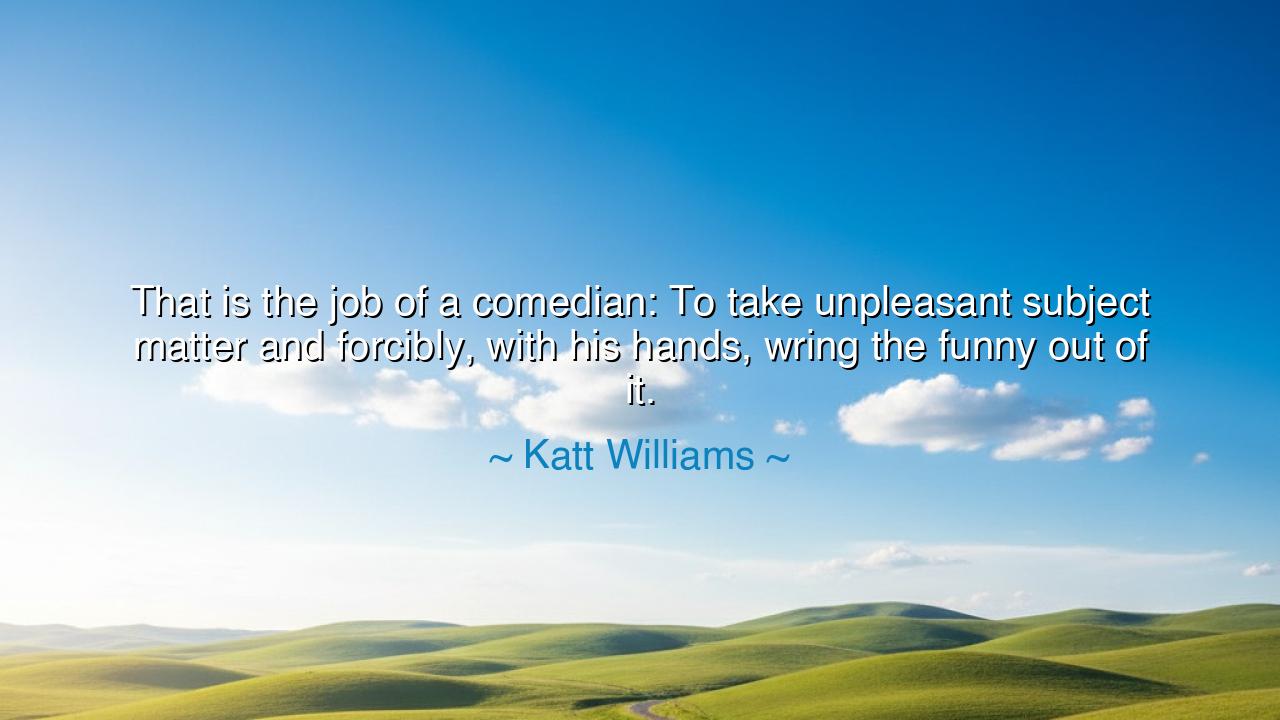
That is the job of a comedian: To take unpleasant subject matter
That is the job of a comedian: To take unpleasant subject matter and forcibly, with his hands, wring the funny out of it.






The words of Katt Williams—“That is the job of a comedian: to take unpleasant subject matter and forcibly, with his hands, wring the funny out of it.”—resound like a commandment from the temple of truth-tellers. It is a declaration of the sacred duty of the jester, the prophet cloaked in laughter, whose task is not to decorate life with shallow amusement, but to transform pain into revelation. In this vision, the comedian is not a mere entertainer, but an alchemist of emotion, one who takes the lead of suffering and hammers it—through courage and craft—into the gold of joy.
To “wring the funny out of it” is to perform an act both violent and redemptive. It is the labor of one who faces darkness unflinchingly, who reaches into the muck of the human condition and pulls from it a spark of light. Just as the ancient blacksmith struck iron to forge the sword, so does the comedian strike sorrow until laughter is born. Katt Williams, through this vivid image, reminds us that comedy is not born of ease—it is wrestled from reality. The hands of the comedian are metaphorical instruments of transformation, shaping chaos into clarity, and pain into perspective.
The ancients understood this truth well. In the Greek theatres of old, the comic and the tragic were not enemies, but siblings born of the same womb. Aristophanes, the father of comedy, often wrapped his satire in ridicule, yet beneath the laughter was the beating heart of philosophy. When he mocked war, greed, or power, he was not merely seeking laughter—he was purifying society through humour. His art, like that of the modern comedian, was a sacred exorcism. By laughing at the worst in ourselves, he freed his people from the weight of hypocrisy. So too does Katt Williams speak of this same lineage—the comedian as priest of pain, whose altar is the stage and whose sermon is laughter.
To take “unpleasant subject matter” and transform it into laughter is to confront the shadows that most men fear to name. The comedian must look upon tragedy, injustice, and absurdity, not with despair, but with defiance. He must say, “I will not let this horror crush us. I will twist it, reshape it, make it absurd—and in doing so, rob it of its power.” In this act lies the deepest magic of humour: the ability to strip pain of its tyranny. The audience laughs, not because they forget the darkness, but because they are reminded that they can still breathe within it.
Consider Charlie Chaplin, that silent master of laughter in the age of despair. When the world was broken by war and hunger, Chaplin created The Great Dictator, a comedy about tyranny itself. He dared to mock the monstrous, to show that laughter could stand where armies trembled. He did what Katt Williams describes—he wrung the funny out of tragedy, not to diminish it, but to elevate the human spirit above it. In doing so, he proved that humour is not cowardice, but courage—the laughter of the living in the face of chaos.
From Williams’s words, we learn that the comedian’s path is not one of comfort, but of service. To make others laugh is easy; to make them laugh while staring truth in the eye is divine work. It demands empathy, timing, and a heart strong enough to carry the weight of the world and still smile. The comedian must be a philosopher who has wept and survived, a healer who disguises medicine in mirth. In his craft lies a lesson for all who face sorrow: that even the darkest pain can yield meaning if we have the strength to wrestle with it.
So let the teaching be this: do not flee from your unpleasant truths. Take them in your hands, as the comedian does, and work them until they yield light. When life wounds you, wring from it understanding. When the world breaks you, shape the pieces into something that makes others laugh, think, or feel. This is the art of resilience, the laughter that redeems. For as Katt Williams reminds us, the job of the comedian—and indeed of every soul who seeks wisdom—is to turn suffering into something that heals, something that binds, something that reminds us that joy is not the absence of pain, but its transformation.
And so, remember this, my friends: the sacred laugh is not born of ignorance but of victory. To wring humour from hardship is to affirm life itself—to declare, even amid the storm, that the spirit of man remains undefeated.






AAdministratorAdministrator
Welcome, honored guests. Please leave a comment, we will respond soon